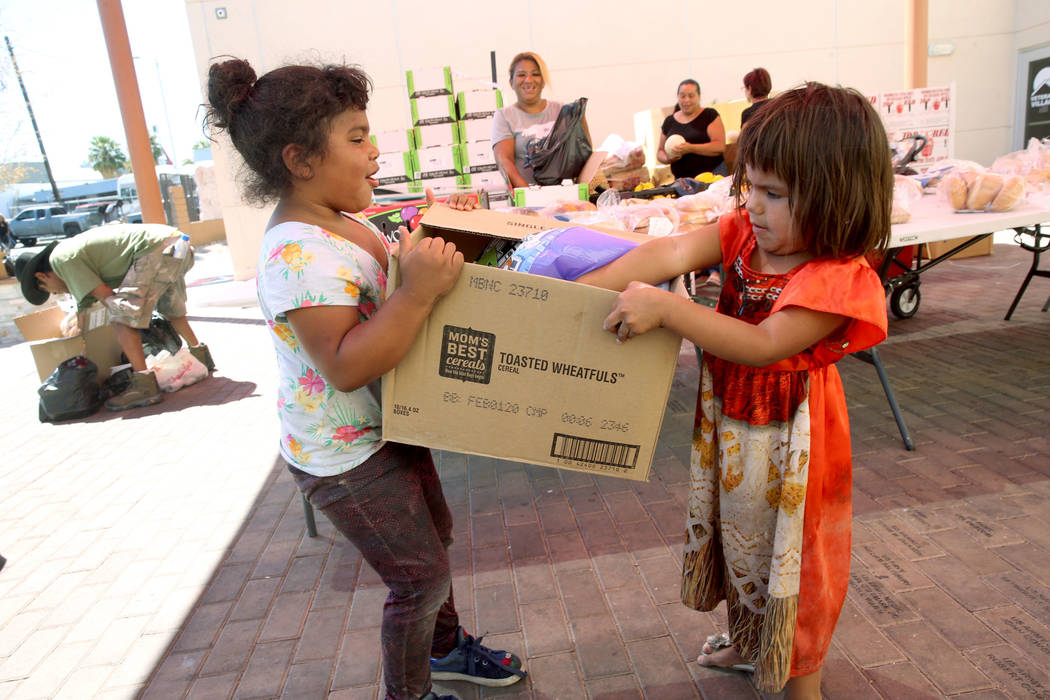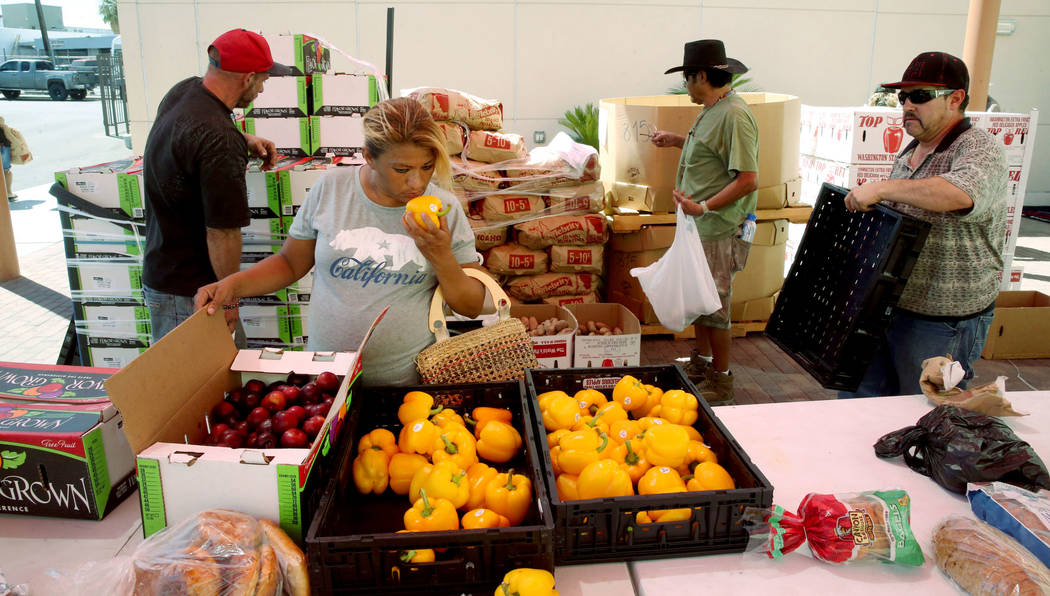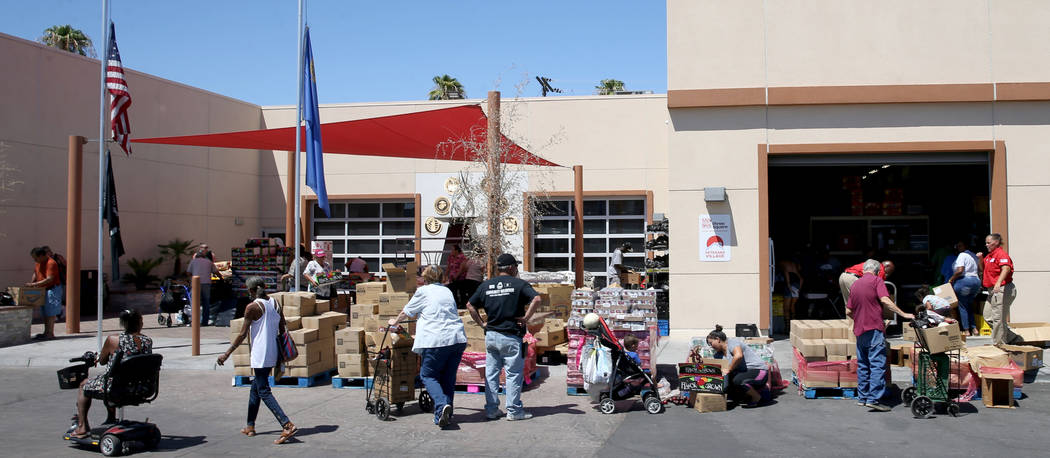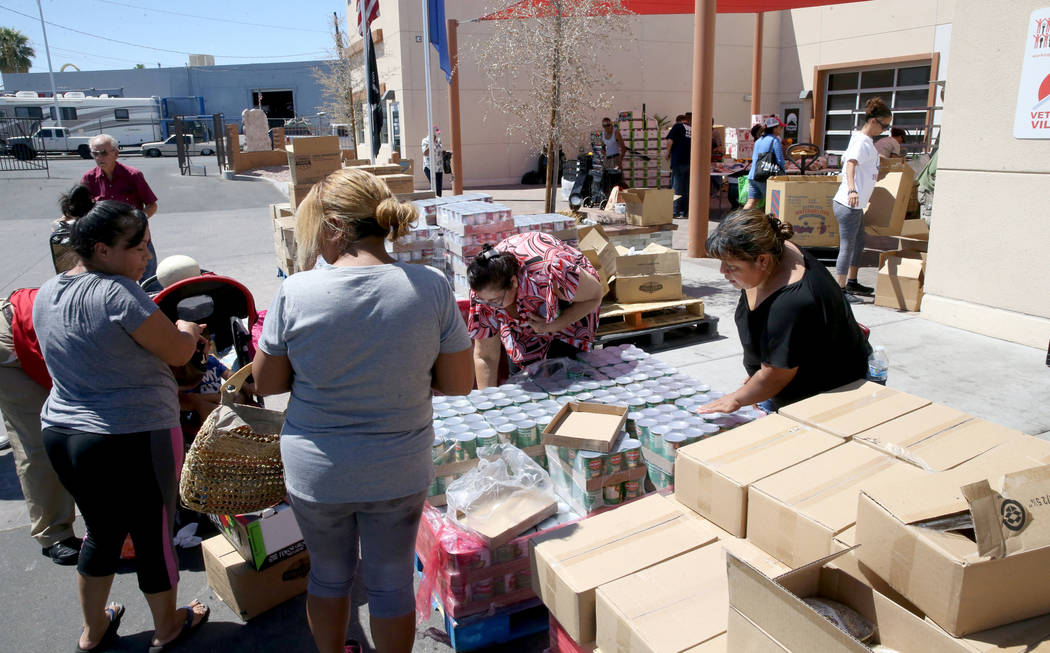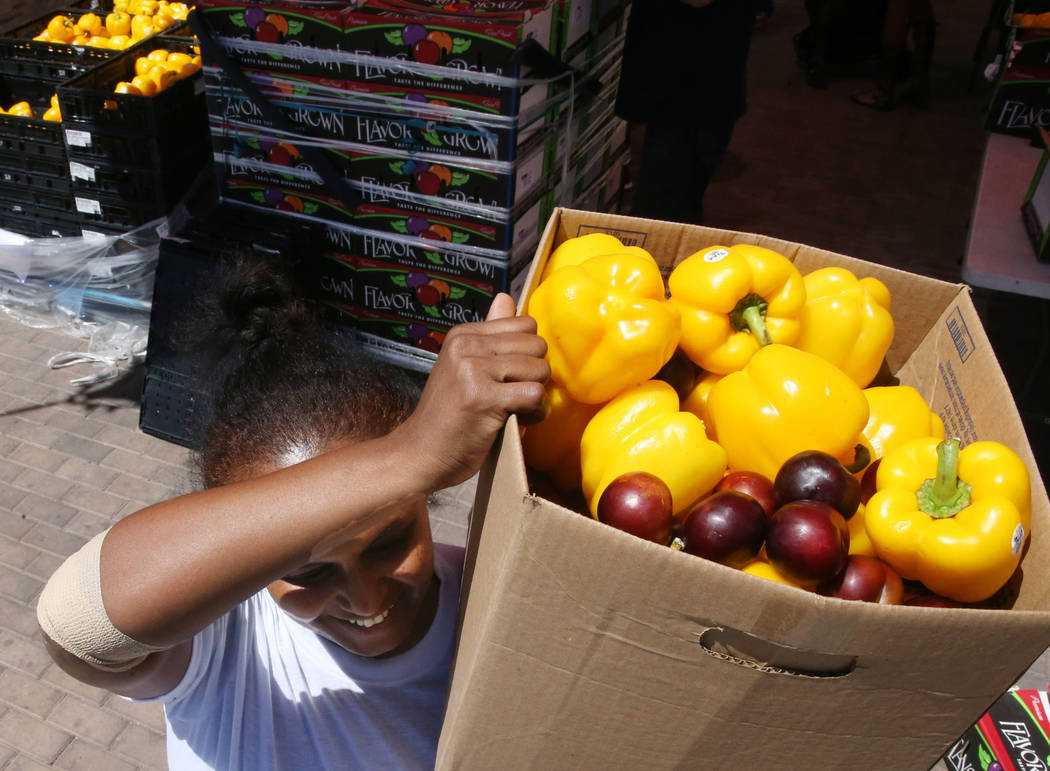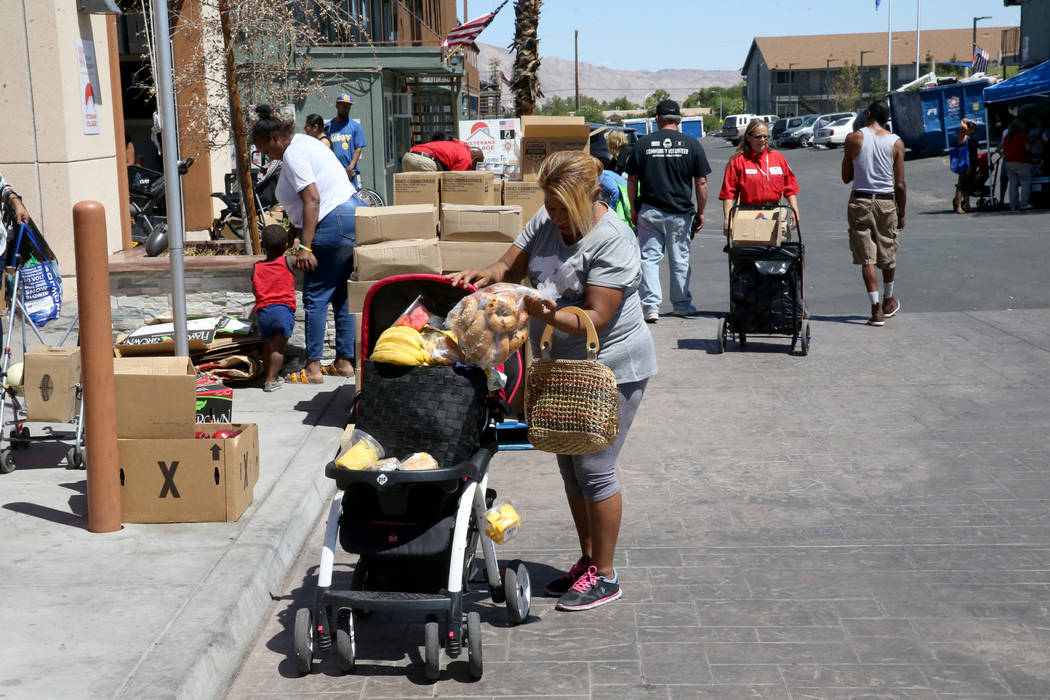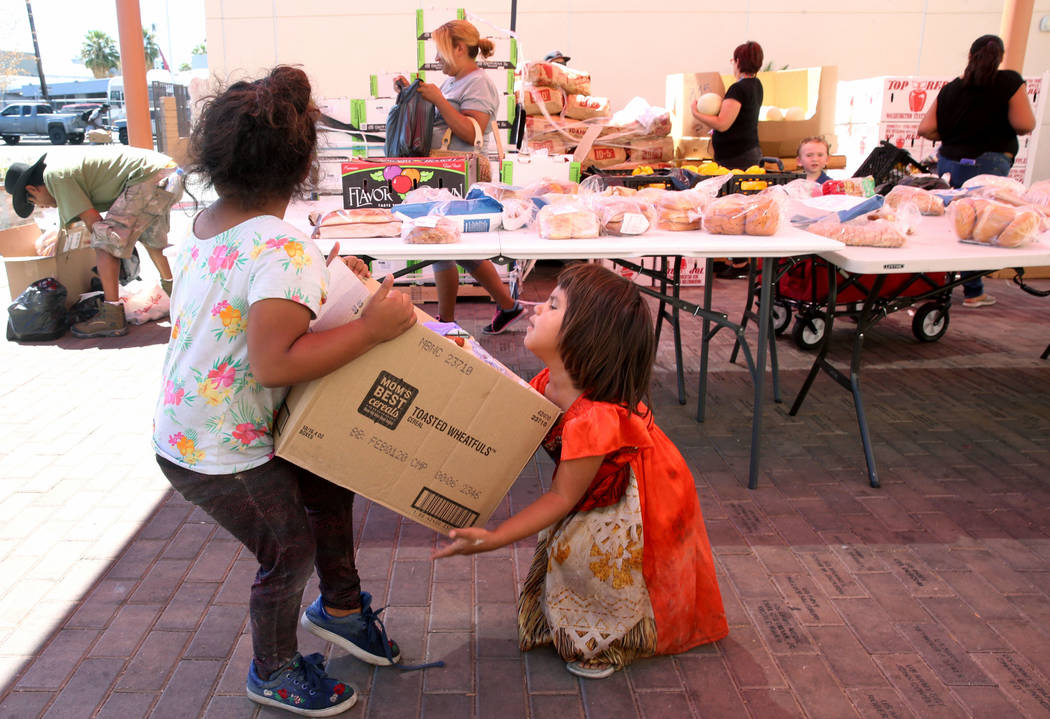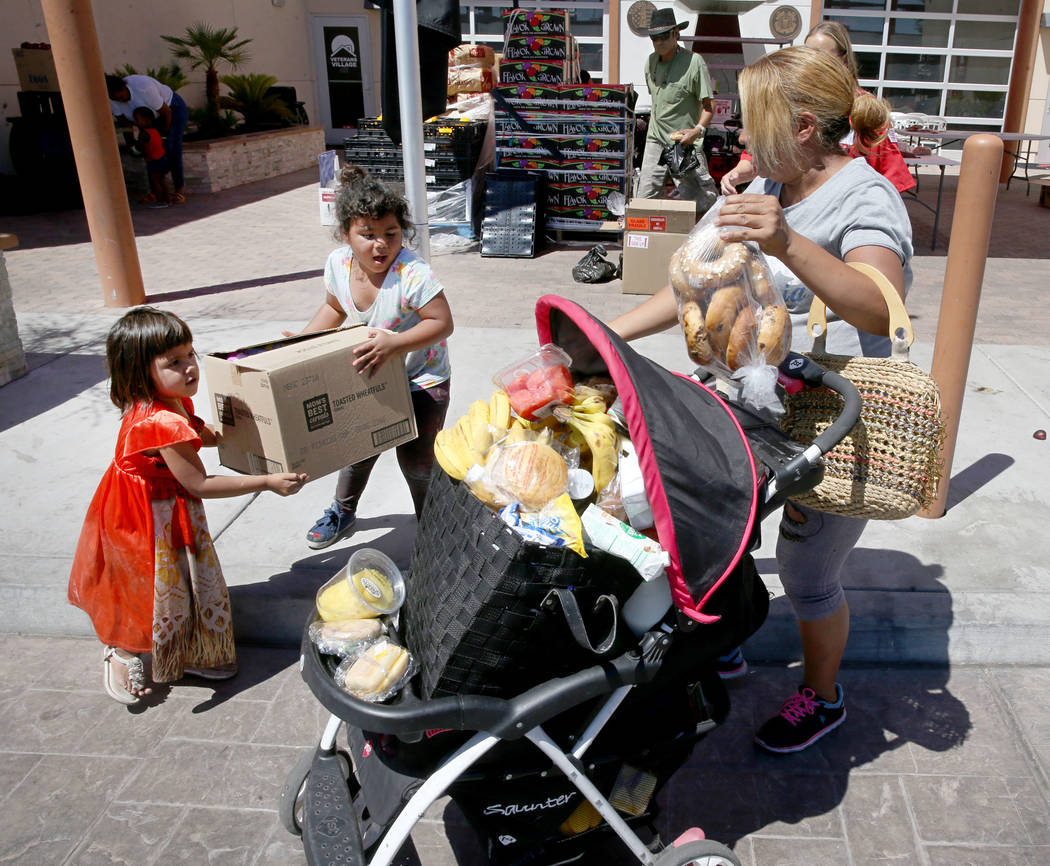46K Nevadans would lose food stamps under proposed federal plan
At the grocery store, Carina Lopez prays that the total on the register doesn’t eclipse her monthly food stamp allotment of $340.
That isn’t enough to feed her family of four all month. So about two weeks later, Lopez, who is due to deliver her third child in just a few weeks, goes to the food bank at Veterans Village to pick up supplies that, with a bit of stretching, will see them through.
That balancing act could get much more challenging if a federal rule change proposed by the Trump administration goes into effect.
The change would knock more than 46,000 Nevadans who currently receive food stamps off the program’s rolls, according to state estimates.
“If we lose the food stamps, it’d be a devastating blow,” Lopez said this week. “But I’d try to find a way. I’d have to feed my family.”
The U.S. Department of Agriculture announced the food stamp rule change last month, saying it will close a “loophole” for the Supplemental Nutrition Assistance Program (SNAP). The proposal, which is open for public comment until Sept. 23 and then must be published in the Federal Register before taking effect, is expected to be challenged in court.
Would end ‘categorical eligibility’
The move eliminates “broad-based categorical eligibility,” which allows some people enrolled in a federal program, such as Supplemental Security Income or Temporary Assistance for Needy Families (TANF), to automatically qualify for food stamps.
At least 40 states and Washington D.C. give benefits to those who would not otherwise be eligible by raising or eliminating income and asset limits.
Nevada is one of the states to allow recipients of TANF to qualify for food stamps if they earn less than 200 percent of the federal poverty level.
The rule change would restrict SNAP to people who directly qualify under the program’s income-level guidelines, which require that family earnings not surpass 100 percent of the federal poverty level or 130 percent for those who are disabled or elderly.
For example, a family of three making more than about $2,310 a month would no longer qualify for food stamps.
That would add considerable stress to budgets already stretched to the breaking point, like Lopez’s.
Lopez’s husband, Jose Lopez, earns about $1,700 a month working as a landscaper and has to pay child support for a child from a previous relationship, she said. That leaves the couple, who have two young daughters, virtually broke after paying their $840 a month rent.
“It’s my job to take care of the food,” Lopez said at the food bank through a translator. “I’m barely making it by; this is the only thing that helps me.”
According to the annual homeless census released this month, Nevada has the greatest shortage of affordable housing in the nation, and a single-earner family must earn $18.85 an hour to afford a two-bedroom apartment at fair market rent.
If enacted as written, the new food stamp rule would knock 11 percent of state residents out of the program, excluding the disabled and elderly, and up to 3.1 million nationwide, according to estimates.
The state welfare office also estimates this proposal will also translate to an approximate decrease of more than $9 million per month for the Nevada economy.
‘Never a loophole’
The nonprofit Three Square, the main food bank in Southern Nevada, which provides food assistance to residents of Lincoln, Nye, Esmeralda and Clark Counties through nearly 1,400 community partners, disputes the administration’s characterization of categorical eligibility as a “loophole.”
“It was never a loophole; the regulation did not change, it was just the interpretation that made people aware that if they don’t qualify for other benefits, they still might be able to qualify for SNAP,” said Jodi Tyson, vice president of strategic initiatives for the nonprofit, which distributed more than 39 million meals last year.
“We’re going to be throwing working families off of benefits who are struggling to make ends meet.”
The loophole discussion made headlines this year after a Minnesota millionaire told lawmakers that he was able to receive $300 a month in food stamps after he retired because his income plummeted.
Proponents of the change say it’s a matter of motivating people to get off public assistance.
“What we want is a system that does not encourage people to have a long-term status of dependence,” said Horace Cooper, co-chairman of the Project 21 National Advisory Board, a political group for black conservatives. “We want people to move as quickly as possible to independence.
“We are in the hottest job market. By changing the rules for TANF, we’re encouraging people to get out in the marketplace while it’s hot, get self-sufficient today.”
But Tyson disputes that, saying the average length of someone on SNAP is about seven months.
“It’s the largest safety net program against food insecurity,” she said.
Not there by choice
At Veterans Village, off North 21st Street in Las Vegas, CEO Arnold Stalk said that most of the people who come to his food bank don’t want to be there.
“It’s not their first choice; they don’t like it,” he said. “The vast majority want to be financially independent. It’s always so easy to criticize someone who takes public assistance because a lot of people don’t understand what it feels like to have to ask for it.”
At Stalk’s food bank on Wednesday, Lopez pushed her makeshift shopping cart made out of a baby stroller, stuffed with chocolate chip bagels, bananas, watermelons and juice. Nearby, her two young daughters — 5-year-old Michelle Morales and 3-year-old Briyit Morales — held tightly onto the sides of a cardboard box filled with potatoes.
They lugged their groceries across North 21st Street and sat in the shade under a tree, waiting for their ride home.
Contact Briana Erickson at berickson@reviewjournal.com or 702-387-5244. Follow @ByBrianaE on Twitter.
Other administration initiatives
The proposed change in food stamp rules is just one of several recent Trump administration initiatives aimed at trimming the rolls of public welfare programs. Two other recent proposals are aimed at preventing undocumented immigrants from using such public programs:
— A new federal rule introduced this week will penalize immigrants seeking citizenship if they have collected public assistance. The rule, set to take effect Oct. 15, will allow citizenship determinations to consider if a candidate could become a "public charge" due to past or projected use of welfare benefits, such as Medicaid or food stamps.
— Earlier this year, the Department of Housing and Urban Development proposed a rule intended to prevent thousands of people who are in the country illegally from receiving federal housing aid.
The proposal would affect approximately 25,000 families that now receive such aid because they are of "mixed" status, meaning at least one member of the family is undocumented while others are citizens or legal residents.
In Clark County, that would affect about 284 families, or 1,022 adults and children, social service manager Michele Fuller-Hallauer said.



